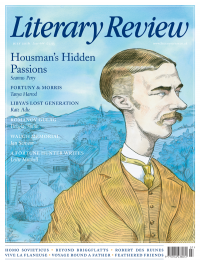Yasmine Seale
Everything in Flux
Falling Awake
By Alice Oswald
Cape Poetry 81pp £10
Alice Oswald’s second volume, Dart (2002), is a long liquid poem made of voices. Some were drawn from the people who live and work on the river of that name, whom Oswald spent three years recording. Their babble mingles with other voices, mythic and actual, some asleep, some drowned. It is ‘water’s soliloquy’. The sailmaker and the sealwatcher have their say, so too do stones and salmon, but all voices ‘should be read as the river’s mutterings’.
That poetry might borrow its shape from water is an idea pursued in Oswald’s new collection. The guiding theme is flux, which is both a fact and a kind of vanishing act: ‘my voice being water/which holds me together and also carries me away’. The poems vary in form, slip-shape (to borrow her term), unwilling to settle, as though performing the mutability they describe, like water which is only ever partly itself. Readers of Dart and Memorial may miss the majestic coherence of their book-length poems, but a collection must be judged on its own looser terms. The pieces included here are held together by Oswald’s luminous, almost alien powers of observation. Their subject is that curious category, the natural world, the name we give to all that isn’t human.
Falling Awake gives to nature the sort of awed attention one might pay the work of an infinitely gifted fellow artist – alive to its devices, envious of its ease. The opening poem searches rain for its secrets like an apprentice at the elbow of a master. Rain is a

Sign Up to our newsletter
Receive free articles, highlights from the archive, news, details of prizes, and much more.@Lit_Review
Follow Literary Review on Twitter
Twitter Feed
How to ruin a film - a short guide by @TWHodgkinson:
Thomas W Hodgkinson - There Was No Sorcerer
Thomas W Hodgkinson: There Was No Sorcerer - Box Office Poison: Hollywood’s Story in a Century of Flops by Tim Robey
literaryreview.co.uk
How to ruin a film - a short guide by @TWHodgkinson:
Thomas W Hodgkinson - There Was No Sorcerer
Thomas W Hodgkinson: There Was No Sorcerer - Box Office Poison: Hollywood’s Story in a Century of Flops by Tim Robey
literaryreview.co.uk
Give the gift that lasts all year with a subscription to Literary Review. Save up to 35% on the cover price when you visit us at https://literaryreview.co.uk/subscribe and enter the code 'XMAS24'